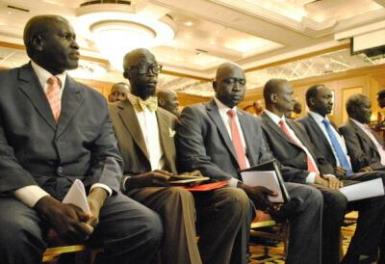Exiled S. Sudanese back interim government without Kiir, Machar
By Tesfa-Alem Tekle
March 3, 2014 (ADDIS ABABA) – South Sudanese living in neighboring Ethiopia say they fully support the formation of an interim government that excludes both President Salva Kiir and his ex-deputy Riek Machar, who now leads a rebellion against the government.

The proposal is, however, silent as to whether or not the interim government would exclude or include the two influential leaders.
But at a meeting held in Addis Ababa, Ethiopia last weekend, the South Sudanese community discussed the current situation in their country as well as the ongoing peace talks aimed at ending the conflict, which has killed an estimated 10,000 people and displaced 695,200 people within the world’s youngest nation. An additional 190,000 have fled the new nation into neighbouring countries, with 54,000 in Ethiopia.
In a statement, the group said, “Our interest as nation should be to build enduring relationships with our fellow citizens that are characterized by mutual respect, fighting a common enemy and for a common goal and long term commitment. Our enemy is the one who deny us any of our rights whether they are from within or out.”
Participants stressed that President Kiir, whose forces are accused of targeting civilians in Juba during the first days of the conflict, must leave power if democratic rights and human rights of South Sudanese are to thrive.
“The president doesn’t just deserve to leave power but not to live this life because he is by no means better than the innocent persons whom he denied their right to live, let alone the basic services he didn’t provide to their demand for the last nine years” said Nyapieth Lonny, one of the community members.
With regard to internally displaced persons, another participant, John Luate, accused Kiir’s government of deceiving them to return home but they allegedly ended up being slaughtered in cold blood.
Lonny further said that the cessation of hostility signed on 23 January and the peace talks in general are not doing any good on the ground and these violations that neglected the aspiration of the people would eventually jeopardise the implementation of the whole peace process.
The group said South Sudan needs an interim government without both President Kiir and rebel leader, Machar. The political ambitions and personal animosity between the two, and the echoes of the current conflict has reawakened Machar’s previous split from the SPLM/A in 1991 during the civil war. As such, many have argued that these key hurdles need to resolved to pave way for peace and reconciliation.
South Sudan should adopt a federal and decentralised system whereby the sovereign power is invested in the hands of people and the rule of law is given an interim constitutional protection, the diaspora group said.
The group accused both pro and anti-government forces of committing atrocities, saying the government’s genocidal force that dragged innocent people from their residential houses in Juba cannot be pardoned by any law.
One of the speakers, Deng Achuoth shouted: “We cannot buy in any lie that states that atrocities were committed by both sides. Things should be traced from their causes not their effects!”
Achouth added the accountability for the mass killing and property looted in Juba has to be the starting point for the settlement of the conflict followed by the events in Jonglei, Unity and Upper Nile, where the conflict quickly spread to.
Sudan Tribune understands that some 2,000 South Sudanese took part at the meeting.
(ST)
